Menu
Table of contents
Recognizable, right?
Fortunately, there are now plenty of tools that can help you do that. Tools that can, for example, come up with the title of your blog or the headings of your blog.
I like to list 10 of these tools for coming up with topics for your blog.
1. ChatGPT
So. If there is one tool in this list that took the Internet by storm recently, it was ChatGPT.
If you use LinkedIn a lot, it seems like ChatGPT is going to replace us all. That's not the case, of course, but ChatGPT is going to take over a lot of people and repetitive tasks.
And ChatGPT is going to make a lot of actions that normally take a lot of work easier and faster. That includes coming up with blog topics.
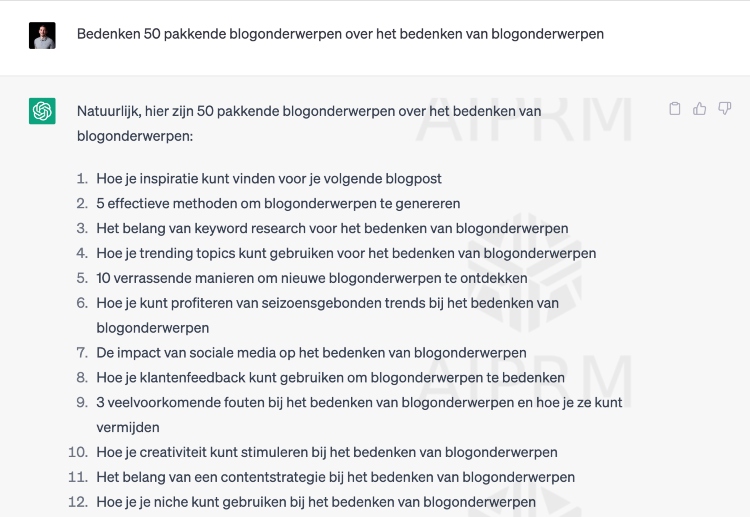
But what if you still have no idea at all what you want to write about? Well, then ChatGPT can help you, too.
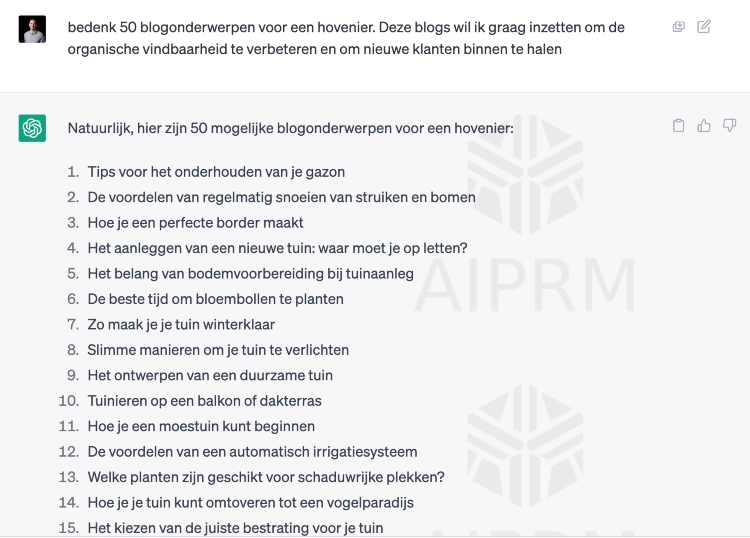
Of course, you still have to use your own common sense and think about SEO yourself, but it can save you a lot of time.
2. AnswerThePublic
AnswerThePublic went viral in 2018, is free to use and is known for giving you immense input into your content strategy. Neil Patel now owns the tool, and in doing so, it does all become a bit more commercial.
The tool works as follows:
- Go to the AnswerThePublic website
- Choose the correct language
- Enter your keyword you want to write something about
- Click on "Get Questions.
And you get hundreds if not thousands of queries, suggestions, comparisons and related search terms that mention the keyword you entered.

3. KWFinder
KWFinder is, in my opinion, one of the best(er) (affordable) keyword analysis tools on the market. KWFinder has all the features you are used to from keyword retrieval tools, but with some extra functionality.
To find out blog topics and related keywords with KWFinder, you need to go through the following steps:
- Go to the KWFinder website and create a free account
- Enter your keyword, select the correct country, choose the correct language and click 'Find keywords'.
- Then select the "Autocomplete" or "Questions" feature at the top and let the tool do its job.

Pro tip: You can now use KWFinder for free for 10 days without entering your credit card information. Create an account by clicking here.
4. Hubspot's Blog Topic Generator
In terms of design, I think this is the most fun tool for coming up with blog topics. Unfortunately, the Hubspot Blog Ideas Generator is not available in Dutch, so you still have to translate the output.
Hubspot's Blog Idea Generator works as follows:
- Go to Hubspot's website
- Enter your keyword and click "Add.
- Click on "Give Me Blog Ideas.
- Click through the topics and determine if there is something for you among them.
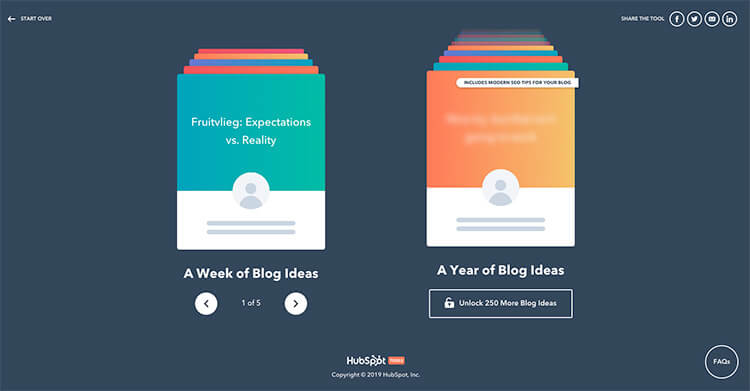
5. Tweak Your Biz Title Generator
Tweak Your Biz's Title Generator can be compared to AnswerThePublic. With a few mouse clicks, you are presented with hundreds of topics.
Unfortunately, these are also in English, so you will still have to translate them yourself. The Title Generator works as follows:
- Go to the Tweak Your Biz website
- Enter your keyword and indicate whether it is a noun (noun) or a verb (verb)
- Then click "Submit!" and tadaaaa: hundreds of blog topics.
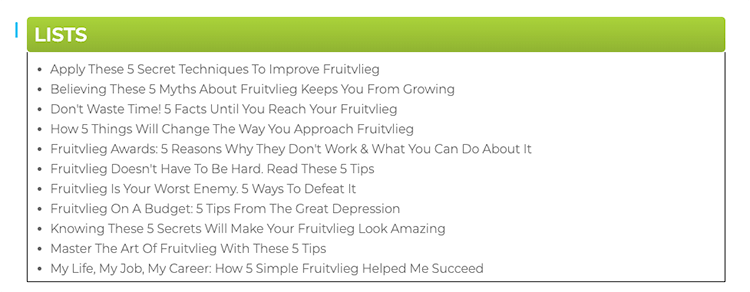
6. SEMrush Topic Research.
SEMrush is an all-in-one SEO tool that supports you in every area of search engine optimization. So also coming up with topics for your blog.
Within SEMrush, this is called the Topic Research and this is a fairly new tool within SEMrush. You use the Topic Research as follows:
- Go to the SEMrush website and create a free account
- Next, go to Topic Research
- Then enter your keyword, select Netherlands as the country and click on 'Get content ideas'.
Next, you will be presented with a similar mind map to AnswerThePublic's mind map, be presented with a list of useful blog topics, and also check off a list of related search queries.
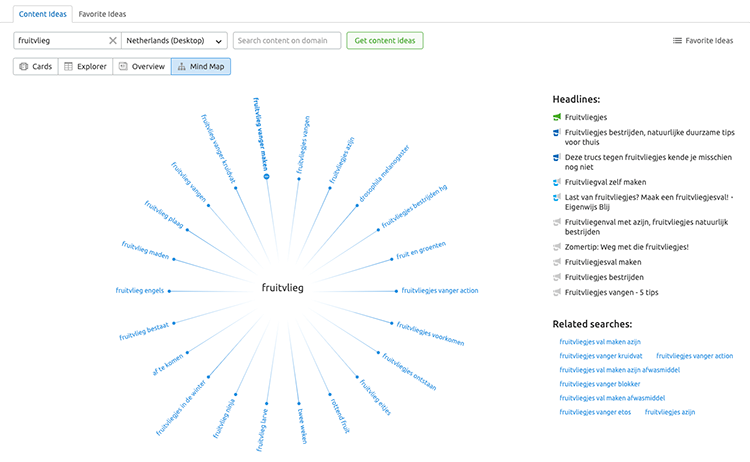
Personally, I think Semrush has one of the most complete blog topic tools. The only drawback of SEMrush is that compared to the competition, you do get to see a smaller number of possible topics.
7. Ubersuggest
Ubersuggest, like KWFinder, is a keyword analysis tool that can do more than just come up with blog topics. It is one of the best alternatives to the Google Keyword Planner and is also free to use.
Ubersuggest works as follows:
- Go to the Ubersuggest website
- Enter your keyword, select 'Dutch / Netherlands' and click search
- Click on "Content ideas" on the left and you will get a list of topics for your blog ranked by which blog will do best in terms of Facebook shares.
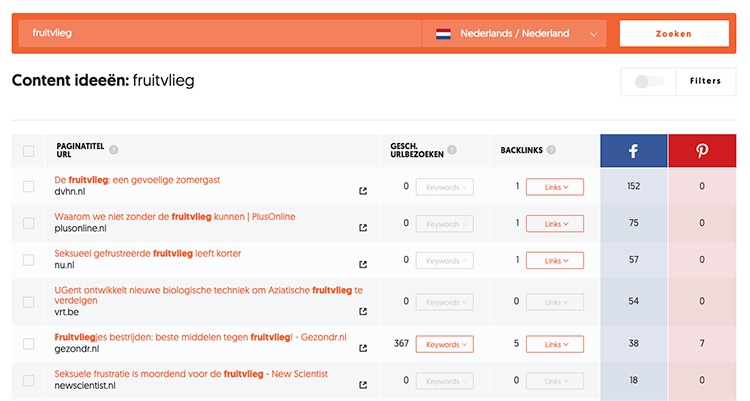
8. Ahrefs Keyword Ideas
Ahrefs is, in my opinion, the best SEO tool in the field of link building. It has one of the largest databases, offers an awful lot of valuable information and is also incredibly strong when it comes to content.
The downside is that Ahrefs is pretty pricey. And by pricey, I mean $400 a month....
Ahrefs also has a feature built in for coming up with blog titles and works as follows:
- Go to the Ahrefs website and create an account
- At the top, click on the "Keyword Explorer.
- Enter your keyword and click on the magnifying glass
- Scroll down until you see the section called "Keyword Ideas by search volume.
That's where you need to be.
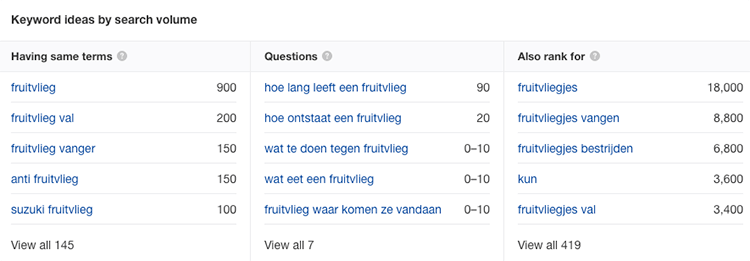
9. Link Bait Title Generator
The Link Bait Title Generator belongs among tools like the Hubspot Topic Generator. The tool is incredibly simple and generates five possible titles at a time (but then again, you can refresh this unlimitedly).
Only drawback is that this tool too is only available in English. The Link Bait Title Generator works as follows:
- Go to the website of Link Bait Title Generator
- Enter your keyword where it says "e.g. cats," click "Get Headlines" and get 5 blog topics.
- Then click Generate More Headlines at the bottom to generate 5 new titles.
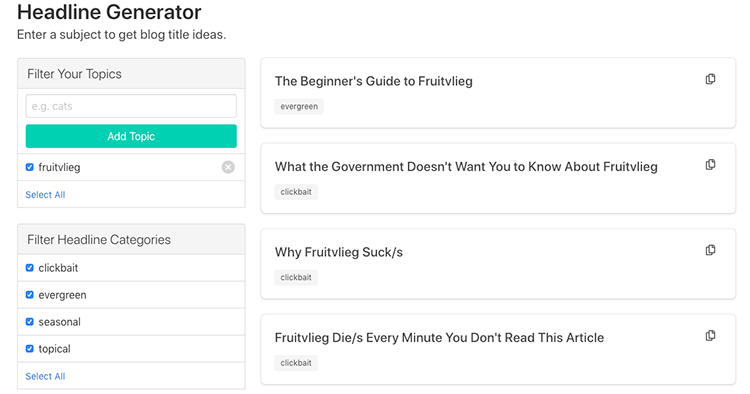
10. Portent's Content Idea Generator
Portent's Content Idea Generator is different from all the others on this list. In fact, this is the only tool on the list that focuses on quality and not quantity.
With Portent's Content Idea Generator, you won't be presented with 5, 10 or 100 blog topics or title, just one. With helpful explanations, tips and funny jokes, but unfortunately in English.
You can use Portent's Content Idea Generator as follows:
- Go to the Content Idea Generator website
- Enter your keyword and click the arrow
- Read the tips, advice and jokes and get inspired

Bonus: 3 helpful tips
As a bonus, in addition to these 10 helpful tools, I want to give you a few tips that have helped me tremendously. Those three tips are:
1. Use your common sense and think logically, you can go a long way with that!
2. Look for keywords from competitors.
3. Capitalize on current events.
With these three tips and 10 tools, you should come a long way in coming up with your own blog topics. If you still have questions, tips or a good suggestion for a tool I haven't mentioned yet, I'd love to hear about it in the comments.
This article was written on September 29, 2019 and updated on May 2, 2023
Why are good blog topics important?
Good blog topics are important because they keep your readers interested and coming back for more. A catchy topic can cause your blog post to be shared on social media and attract more traffic to your site.
How do I come up with good blog topics?
There are several ways to come up with good blog topics. You can look at what's trending in your field, brainstorm with colleagues, or ask questions of your target audience. You can also draw inspiration from other blogs or news articles.
Should I always blog about my own field?
It is not always necessary to blog only about your own field. You can also write about related topics of interest to your target audience. That way, you can give your readers a broader perspective and position yourself as an expert in multiple fields.
How long should a blog topic be?
A good blog topic is short and sweet. It should capture the essence of your blog post in one sentence. Generally, it's better to keep your topics under 70 characters so they don't get broken off in search results.
What are some examples of good blog topics?
Some examples of good blog topics are "5 ways to improve your productivity," "The benefits of a plant-based diet," and "How to develop an effective social media strategy. These are topics that are relevant to your target audience and that they can get value from.











Written by: Daniel Kuipers
Daniel is the founder of Online Marketing Agency. He constantly scours the Internet for the latest gadgets and tactics and blogs about them in understandable language. Well, sometimes.